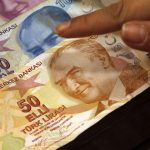By Edward G. Stafford
The events of the last few weeks have confirmed several fundamentals about U.S.-Turkish relations: 1, the presidents of the two countries set the course of relations; 2, President Donald Trump, if not both men, trusts his instincts more than his advisors; 3, both do not wish to break relations between the two NATO Allies, but are prepared to do so if needed to attain their national security goals.
Last weekend, Trump tweeted a threat to devastate the Turkish economy if Turkey attacked the U.S. battlefield ally against ISIS, the Syrian Kurds of the Syrian Democratic Forces (SDF). It is unheard of to direct such language at a long-standing treaty ally. Washington was awash with commentary about the disastrous effect these threatening words would have on U.S.-Turkish relations. Senior Turkish officials dismissed the threats , declaring that Turkey will deal with the YPG as it sees best.
Then came a phone call between President Recep Tayyip Erdoğan and Trump . The readouts differ, but the prospect of economically devastating sanctions or tariffs against Turkey has receded and Trump is tweeting that he and Erdoğan are in agreement on the protection of America’s battlefield allies and the utility of a 20-mile (32 km) safety zone in northeastern Syria running along the border east of the Euphrates to the border with Iraq. One suspects that they agreed Turkey could deal with terrorists as it likes, but must not attack the non-terrorists U.S. battlefield allies – details left for further discussions.
Then came the murderous ISIS attack on U.S. forces and Syrian civilians in Manbij . Speculation arose immediately in Washington about the impact it would have on Trump’s decision to withdrawal U.S. troops. The most likely interpretation by Trump is that this is further evidence that U.S. ground troops need to go home. Better, in his view, that local forces more familiar with the situation continue the fight against ISIS with U.S. support via remotely operated surveillance and with air support and logistics from bases in neighbouring countries.
Whether intentionally or not, ISIS sent a loud and clear message to Turkey about the dangers it will face when it takes over from the United States the lead in the battle against the extreme jihadist group in Syria. Thus, although the ISIS attack in Manbij will not change Trump’s plans, it may lead to greater coordination in the withdrawal of U.S. forces between the two NATO allies’ military commanders, a good thing for ongoing relations, military and otherwise.
Erdoğan apparently suggested a safe zone or similar and Trump apparently agreed, or vice versa. It matters little who initiated the proposal. Now comes the implementation. The Turkish military is not by tactical training, nor in strategic planning an expeditionary force. In actions against the Kurdistan Workers’ Party (PKK) in the southeast of Turkey, the military has operated a strategy of counter-insurgency mixed with counter-terrorism with limited success for more than 30 years.
Turkish forces will benefit from proximity to supplies and air support if their range of operation is limited to a 20-mile band along the border. They will also be under the cover of Turkish mobile artillery placed just inside Turkey. In military, political, and foreign relations terms, a relatively narrow band along the border with most heavy weapons still in Turkey has advantages. Likewise for personnel – short forays deeper into Syria, but with return to Turkey or the safety zone make more sense than operations of extended distance and duration into Syria.
While Turkish forces are not expeditionary, neither is the YPG/SDF, so for Turkey to keep much of its heavy equipment and support personnel in or near Turkey reduces the threat from YPG attacks. However, presumably the YPG knows how to produce improvised explosive devices that would be effective against Turkish armour and personnel.

With local elections on March 31, Erdoğan cannot afford the political fallout from high casualties among Turkish troops serving in Syria, fallout lessened if those soldiers die on Turkish soil or in an established border zone many would not consider a foreign deployment.
In negotiations with Russia on post-civil war Syria, Erdoğan can argue the Turkish presence in a narrow border strip is only to facilitate Turkish security and in no way presents a challenge to Syrian territorial sovereignty or Russian pre-eminence in the country. Yet regardless of that disingenuous interpretation, their presence increases Turkey’s leverage at the negotiating table – we can only pray that it will not cost the lives of Turkish soldiers to have that leverage.
Which brings us back to Manbij and the possibility that in following his instincts, Erdoğan has fallen into a trap not in the best interests of Turkey in agreeing to take on the obligation to fight ISIS. Though greatly wounded and much reduced, ISIS demonstrated that it still could kill, even in areas that were liberated from its control.
It would be a political disaster for Erdoğan if ISIS begins successfully targeting Turkish personnel in northern Syria. Having told Trump and the world that Turkey could take care of the remnant of ISIS and the United States could return its soldiers to their homes and families, Erdoğan would face serious criticism if large numbers of Turkish soldiers returned to their home and families in body bags.
Thus, Erdoğan and Trump are masters of their respective countries’ foreign policy. In both cases, their remaining foreign policy advisers are unlikely to challenge or attempt to restrain the impulses and instincts of the boss.
If success comes their way, if the withdrawal of U.S. forces occurs in an orderly way, if the United States’ Kurdish battlefield allies are protected, if ISIS does not re-animate as a significant force, if Turkey successfully pursues operations against the remnant of ISIS, then Trump’s instincts will have proven superior to his adviser’s counsel.
If the YPG is blunted and deterred from operations against Turkey, if the remnants of ISIS are destroyed or rendered ineffective, if Turkish casualties are light, if Russian President Vladimir Putin and Syrian President Bashar Assad recognise a place for Turkey at the negotiating table, if the AKP scores well in municipal elections because of the presumed success of his foreign policy gambits, and standing up for Turkey, then Erdoğan will have shown himself as skilled in foreign policy as he is in domestic electioneering.
Ironically, we all have to hope they do succeed, and thereby gain in stature in their respective countries. We must do so not only for the benefit of the people of Syria, Turkey, and the United States, but because the likely result of failure for either man would be to blame the other for not having done enough, and we will be back to mutual recriminations via tweets and speeches between the two masters of U.S.-Turkish relations.



